 For a long time, we treated art as an illustration, the idea that it was a product of its context. But what if we inverted that, since we live in an image civilization, and think of an image as a production, not a product, it produces values, it produces conceptions. And also, when you criticize internally that whiteness classification, we can go through a lot of different questions: who are the people being portrayed? They are, in general, men.
For a long time, we treated art as an illustration, the idea that it was a product of its context. But what if we inverted that, since we live in an image civilization, and think of an image as a production, not a product, it produces values, it produces conceptions. And also, when you criticize internally that whiteness classification, we can go through a lot of different questions: who are the people being portrayed? They are, in general, men.
Face to face
28.03.2024 | by Marta Lança
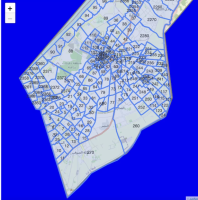 A investigação expõe o uso de um sistema chamado "Habsora" ("O Evangelho"), que utiliza tecnologia de Inteligência Artificial para gerar quatro tipos de alvos: alvo tático, alvo subterrâneo, alvo de energia e casas de família. Os alvos são produzidos de acordo com a probabilidade de que combatentes do Hamas estejam nas instalações. Para cada alvo, é anexado um arquivo que "estipula o número de civis que provavelmente serão mortos num ataque". Esses arquivos fornecem números e baixas calculadas, para que, quando as unidades de inteligência realizam um ataque, o exército saiba exatamente quantos civis provavelmente serão mortos.
A investigação expõe o uso de um sistema chamado "Habsora" ("O Evangelho"), que utiliza tecnologia de Inteligência Artificial para gerar quatro tipos de alvos: alvo tático, alvo subterrâneo, alvo de energia e casas de família. Os alvos são produzidos de acordo com a probabilidade de que combatentes do Hamas estejam nas instalações. Para cada alvo, é anexado um arquivo que "estipula o número de civis que provavelmente serão mortos num ataque". Esses arquivos fornecem números e baixas calculadas, para que, quando as unidades de inteligência realizam um ataque, o exército saiba exatamente quantos civis provavelmente serão mortos.
To read
02.03.2024 | by Anaïs Nony
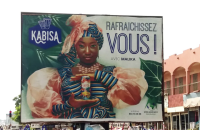 Four hundred years after the institution of slavery set off mechanisms devaluing African aesthetics, many on the continent still have a difficult relationship with African women’s hair. Granted, the natural hair movement has gathered momentum in African countries in the past five years, following earlier trends in the US and Europe. Many more young women today wear natural styles unapologetically just like Ms. Universe 2019. Yet resistance to natural hair, in particular afros and dreadlocks, persists.
Four hundred years after the institution of slavery set off mechanisms devaluing African aesthetics, many on the continent still have a difficult relationship with African women’s hair. Granted, the natural hair movement has gathered momentum in African countries in the past five years, following earlier trends in the US and Europe. Many more young women today wear natural styles unapologetically just like Ms. Universe 2019. Yet resistance to natural hair, in particular afros and dreadlocks, persists.
To read
23.02.2024 | by Yarri Kamara
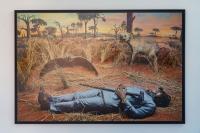 The river remembers the arrival of extractivism. One day many years ago, she feels the wake of huge ships against her current and became uneasy. Over time, she comes to share shivers with felled forests, to balk at the blanched palette of monocrop agriculture, to recoil at the sharp poisonous taste of chemical waste, and to deeply mourn the disappearance of her people: people sold into slavery, killed by disease, worked to death in mines, and severed from her nurturing flows by the breaking of their cultures. Oh, what she has seen. Oh, what she has endured.
The river remembers the arrival of extractivism. One day many years ago, she feels the wake of huge ships against her current and became uneasy. Over time, she comes to share shivers with felled forests, to balk at the blanched palette of monocrop agriculture, to recoil at the sharp poisonous taste of chemical waste, and to deeply mourn the disappearance of her people: people sold into slavery, killed by disease, worked to death in mines, and severed from her nurturing flows by the breaking of their cultures. Oh, what she has seen. Oh, what she has endured.
Mukanda
24.12.2023 | by Imani Jacqueline Brown
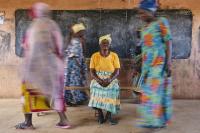 Lee-Ann Olwage, who admits she struggles with her own mental health issues, also has family members who have suffered or are suffering from Alzheimer's. For this reason, she states that, with her work, she aims to create a space in which the people she photographs can play an active role in creating the images and that, above all, makes them feel like the true “heroines” of their own stories.
Lee-Ann Olwage, who admits she struggles with her own mental health issues, also has family members who have suffered or are suffering from Alzheimer's. For this reason, she states that, with her work, she aims to create a space in which the people she photographs can play an active role in creating the images and that, above all, makes them feel like the true “heroines” of their own stories.
Face to face
13.12.2023 | by Mariana Moniz
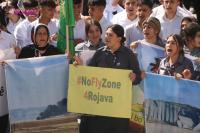 The undersigned express our solidarity with the Kurdish movement made up of children, young people, women, diverse identities and the Kurdish people in struggle for their rights to autonomy and self-determination. And through our personal and collective voice we want to let the world know what is happening in Kurdish territory right now.
The undersigned express our solidarity with the Kurdish movement made up of children, young people, women, diverse identities and the Kurdish people in struggle for their rights to autonomy and self-determination. And through our personal and collective voice we want to let the world know what is happening in Kurdish territory right now.
To read
08.10.2023 | by várias
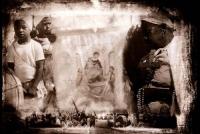 We demand that the Portuguese state, particularly the justice system, recognize the racial motivation behind this assault. We demand that, once and for all, it abandons a "minimalist" legal understanding of racism. We demand that it breaks away from the harmful pattern of denying racism, which endangers the lives of our children, our youth and the democratic life of this country.
We demand that the Portuguese state, particularly the justice system, recognize the racial motivation behind this assault. We demand that, once and for all, it abandons a "minimalist" legal understanding of racism. We demand that it breaks away from the harmful pattern of denying racism, which endangers the lives of our children, our youth and the democratic life of this country.
Mukanda
04.10.2023 | by vários
 Without prejudice to the investigation currently undertaken by the Independent Commission of the Center for Social Studies - whose findings are not yet known - with this statement, we want to express our solidarity and support with all the victims of sexual violence and moral harassment, as well as our support for denouncing these forms of violence anywhere, including at the Centre for Social Studies. We stand against any form of abuse of power
Without prejudice to the investigation currently undertaken by the Independent Commission of the Center for Social Studies - whose findings are not yet known - with this statement, we want to express our solidarity and support with all the victims of sexual violence and moral harassment, as well as our support for denouncing these forms of violence anywhere, including at the Centre for Social Studies. We stand against any form of abuse of power
Mukanda
25.09.2023 | by várias
 This controversy raises many questions, two of which we want to bring to the attention of the international academic community: Can we, as an academic community, allow a private publisher to intervene in and even censor such an important, urgent and necessary debate in our professional field? Academic writing is still the core tool of academic knowledge production worldwide, but when we as researchers are no longer allowed to reflect critically about how to transform our field from within, what are the implications for critical reflection on academia from within?
This controversy raises many questions, two of which we want to bring to the attention of the international academic community: Can we, as an academic community, allow a private publisher to intervene in and even censor such an important, urgent and necessary debate in our professional field? Academic writing is still the core tool of academic knowledge production worldwide, but when we as researchers are no longer allowed to reflect critically about how to transform our field from within, what are the implications for critical reflection on academia from within?
Mukanda
20.09.2023 | by várias
 We present ourselves as a collective of women who have suffered different types of violence as a result of the pattern of abuse of power that was naturalized in the work teams led by Boaventura de Sousa Santos and considered inevitable by the people who occupied positions of authority in the Centre for Social Studies (CES) for many years. Our initial letter is attached below. Since we started to share our reflections, the number of people has increased. We have been in contact with other women who have experienced stories similar to ours. The abuse experienced is not limited to inconvenient moments promoted by a man incapable of understanding that the world has changed. It is very difficult to believe that a professional sociologist, internationally recognized as one of the greatest left-wing intellectuals, cannot understand the changes in society and adapt to them.
We present ourselves as a collective of women who have suffered different types of violence as a result of the pattern of abuse of power that was naturalized in the work teams led by Boaventura de Sousa Santos and considered inevitable by the people who occupied positions of authority in the Centre for Social Studies (CES) for many years. Our initial letter is attached below. Since we started to share our reflections, the number of people has increased. We have been in contact with other women who have experienced stories similar to ours. The abuse experienced is not limited to inconvenient moments promoted by a man incapable of understanding that the world has changed. It is very difficult to believe that a professional sociologist, internationally recognized as one of the greatest left-wing intellectuals, cannot understand the changes in society and adapt to them.
Mukanda
19.09.2023 | by várias
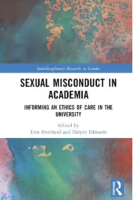 We address your Publisher as a collective of victims of harassment involving Boaventura de Sousa Santos and Bruno Sena Martins in the context of Boaventura de Sousa Santos' academic teams. Our collective is currently formed of seven women, of Brazilian, Portuguese, Peruvian and Mexican nationality. Our lived experiences allow us to confirm the abusive pattern described in chapter 12 of the book Sexual Misconduct in Academia: Informing an Ethics of Care in the University.
The publication of the book was decisive for our mobilization as a collective and for our decision to gather testimonial and documentary evidence that corroborate the various types of violence described in the mentioned chapter. In this sense, we note with great concern the unavailability for sale of the book.
We address your Publisher as a collective of victims of harassment involving Boaventura de Sousa Santos and Bruno Sena Martins in the context of Boaventura de Sousa Santos' academic teams. Our collective is currently formed of seven women, of Brazilian, Portuguese, Peruvian and Mexican nationality. Our lived experiences allow us to confirm the abusive pattern described in chapter 12 of the book Sexual Misconduct in Academia: Informing an Ethics of Care in the University.
The publication of the book was decisive for our mobilization as a collective and for our decision to gather testimonial and documentary evidence that corroborate the various types of violence described in the mentioned chapter. In this sense, we note with great concern the unavailability for sale of the book.
Mukanda
19.09.2023 | by várias
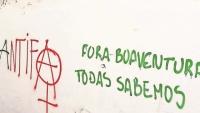 The fact that BSS behaves like a feudal lord no longer surprises us in this “global south”. The same cannot be said of a publisher like Routledge, whose act of censorship does not honor its history (a history that began in 1836 and includes the publication of thinkers and scholars such as Adorno, Einstein, Russell, Popper, Wittgenstein, Jung, Bohm, Hayek, McLuhan, Marcuse, and Sartre). The irony, or hypocrisy, is that Taylor & Francis, the owner of Routledge, even ventures (and rightfully so!) to provide advice to its authors who are victims of harassment in academia...
The fact that BSS behaves like a feudal lord no longer surprises us in this “global south”. The same cannot be said of a publisher like Routledge, whose act of censorship does not honor its history (a history that began in 1836 and includes the publication of thinkers and scholars such as Adorno, Einstein, Russell, Popper, Wittgenstein, Jung, Bohm, Hayek, McLuhan, Marcuse, and Sartre). The irony, or hypocrisy, is that Taylor & Francis, the owner of Routledge, even ventures (and rightfully so!) to provide advice to its authors who are victims of harassment in academia...
To read
11.09.2023 | by João Pedro George
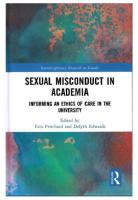 We demand that the editorial immediately republishes the entire book, article included.
We demand that the scholars put in the spotlight by the article cease all persecution of the researchers and the other victims that have come forward.
We demand that those scholars start walking the talk, and be consequent with their writings. This includes making themselves available for a real process of restorative justice.
We demand that academic institutions, including academic presses, seriously commission diverse and unbiased task forces to bring about reparations for the practices of abuse fostered by the racist, capitalist and patriarchal system of which they are part - in a historical and immediate sense.
We all know.
We demand that the editorial immediately republishes the entire book, article included.
We demand that the scholars put in the spotlight by the article cease all persecution of the researchers and the other victims that have come forward.
We demand that those scholars start walking the talk, and be consequent with their writings. This includes making themselves available for a real process of restorative justice.
We demand that academic institutions, including academic presses, seriously commission diverse and unbiased task forces to bring about reparations for the practices of abuse fostered by the racist, capitalist and patriarchal system of which they are part - in a historical and immediate sense.
We all know.
Mukanda
04.09.2023 | by várias
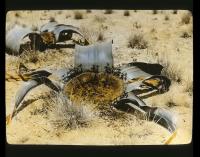 These brief notes focus mainly on possible steps towards the discussion about the decolonisation, or decolonisations, of botanical collections and practices at the University of Coimbra. They are not intended to delimit a unidirectional and hierarchical path of activities to be developed and are not a closed script for a decolonial rereading of the collections, which are a constant challenge, always presenting us with open questions and incomplete answers. My views and writings on this subject stem from a position of privilege as an academic working at the UC, which allows me the time, easier access to the collections under analysis and the freedom to appose narratives onto natural and cultural objects long disconnected from their contexts of origin; I am aware of my limitations in identifying additional perspectives and knowledges, which other voices will be able to bring to the open and ongoing debate.
These brief notes focus mainly on possible steps towards the discussion about the decolonisation, or decolonisations, of botanical collections and practices at the University of Coimbra. They are not intended to delimit a unidirectional and hierarchical path of activities to be developed and are not a closed script for a decolonial rereading of the collections, which are a constant challenge, always presenting us with open questions and incomplete answers. My views and writings on this subject stem from a position of privilege as an academic working at the UC, which allows me the time, easier access to the collections under analysis and the freedom to appose narratives onto natural and cultural objects long disconnected from their contexts of origin; I am aware of my limitations in identifying additional perspectives and knowledges, which other voices will be able to bring to the open and ongoing debate.
To read
01.08.2023 | by António Carmo Gouveia
 The challenge remains: how to create a forward-thinking and progressive community, in which mothers are also represented and included? The work mothers and caregiver musicians cannot be perpetually undervalued or rendered invisible. Continuing to ignore the struggles mothers/caregivers face is unjust, unsustainable and will perpetually leave out many in our field.
The challenge remains: how to create a forward-thinking and progressive community, in which mothers are also represented and included? The work mothers and caregiver musicians cannot be perpetually undervalued or rendered invisible. Continuing to ignore the struggles mothers/caregivers face is unjust, unsustainable and will perpetually leave out many in our field.
To read
01.08.2023 | by Sara Serpa
 The publication of the book was decisive for our mobilization as a collective and for our decision to gather testimonial and documentary evidence that corroborate the various types of violence described in the mentioned chapter. In this sense, we note with great concern the unavailability for sale of the book.
The publication of the book was decisive for our mobilization as a collective and for our decision to gather testimonial and documentary evidence that corroborate the various types of violence described in the mentioned chapter. In this sense, we note with great concern the unavailability for sale of the book.
To read
11.07.2023 | by várias
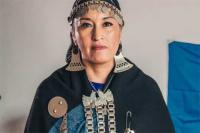 As a result of the painful and humiliating situation caused by your abuse and the realization that my institutional isolation and helplessness at the time were a response to machismo and racism, I channeled my anger and wounds like a guiding force. I embarked on a journey to the ends of the vast territories of Indigenous peoples in Argentina to establish the Movement of Indigenous Women and Diversities for Good Living. Today, I can say that I walked to heal. The academic indifference I endured was replaced by the love and strength of thousands of Indigenous women who experience the violence you embody and represent daily. Regardless of your concerns that the Right is using these complaints, you know you benefit from the system. The Right needs hypocrites like you.
As a result of the painful and humiliating situation caused by your abuse and the realization that my institutional isolation and helplessness at the time were a response to machismo and racism, I channeled my anger and wounds like a guiding force. I embarked on a journey to the ends of the vast territories of Indigenous peoples in Argentina to establish the Movement of Indigenous Women and Diversities for Good Living. Today, I can say that I walked to heal. The academic indifference I endured was replaced by the love and strength of thousands of Indigenous women who experience the violence you embody and represent daily. Regardless of your concerns that the Right is using these complaints, you know you benefit from the system. The Right needs hypocrites like you.
Mukanda
25.06.2023 | by Moira Ivana Millán
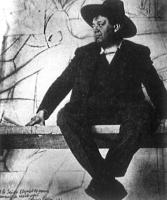 It is said in Mexico that good life stories are passionate. They are happy and painful, they tie and untie blind knots in the throat, like a harsh swallow of cheap tequila.
We set the tone and enter one of the taciturn taverns of the city of Guanajuato - the so-called "cantinas", where personal tales are distilled as the glasses advance. Rough stone walls in the half-light, damp breath. In my head, Chavela Vargas sings "Tú me acostumbraste." It's night and it's raining softly outside.
With a toast, we seal the moment. And we tell a secret life story.
It is said in Mexico that good life stories are passionate. They are happy and painful, they tie and untie blind knots in the throat, like a harsh swallow of cheap tequila.
We set the tone and enter one of the taciturn taverns of the city of Guanajuato - the so-called "cantinas", where personal tales are distilled as the glasses advance. Rough stone walls in the half-light, damp breath. In my head, Chavela Vargas sings "Tú me acostumbraste." It's night and it's raining softly outside.
With a toast, we seal the moment. And we tell a secret life story.
Face to face
27.05.2023 | by Pedro Cardoso
 Two hours with Mia Couto in an engaging conversation that covers various aspects of his interests and career, his affective geographies, the diversity of peoples and their ways of life as inspiration for the stories, the environment, and the development model to be discovered, and how to treat nature not as a "resource". We talked about hard times of violence, and the utopia of Mozambican Independence. Literary subjects do not predominate, although the Mozambican author wishes he had more time to dedicate to writing. Also thinking about how to take the pleasure of reading further and how to help bring out new writers. A writer in the terrain.
Two hours with Mia Couto in an engaging conversation that covers various aspects of his interests and career, his affective geographies, the diversity of peoples and their ways of life as inspiration for the stories, the environment, and the development model to be discovered, and how to treat nature not as a "resource". We talked about hard times of violence, and the utopia of Mozambican Independence. Literary subjects do not predominate, although the Mozambican author wishes he had more time to dedicate to writing. Also thinking about how to take the pleasure of reading further and how to help bring out new writers. A writer in the terrain.
Face to face
22.05.2023 | by Marta Lança
 The Academy (with a capital A and in singular) is for us a field of contestation. And, without a doubt, we are all positioned in it once we dare to enter it, dialogue with it, challenge it, inhabit it and/or co-construct it. Many of us have occupied this space by choice and with conviction. We face this reality every minute of our lives. That is why the manifesto “We all know” resonates and challenges us when it states that epistemic extractivism is structural and not just an isolated event in the Academy. When it affirms that the Academy is hierarchical and hierarchizing and that it promotes the accumulation of power of those at the top.
The Academy (with a capital A and in singular) is for us a field of contestation. And, without a doubt, we are all positioned in it once we dare to enter it, dialogue with it, challenge it, inhabit it and/or co-construct it. Many of us have occupied this space by choice and with conviction. We face this reality every minute of our lives. That is why the manifesto “We all know” resonates and challenges us when it states that epistemic extractivism is structural and not just an isolated event in the Academy. When it affirms that the Academy is hierarchical and hierarchizing and that it promotes the accumulation of power of those at the top.
Mukanda
28.04.2023 | by várias